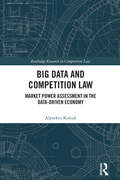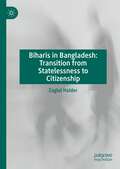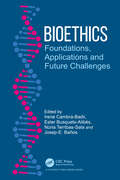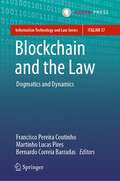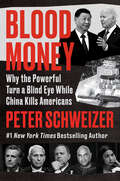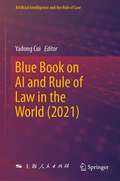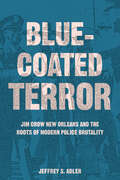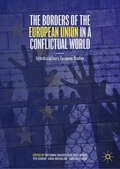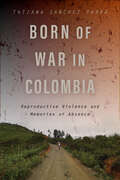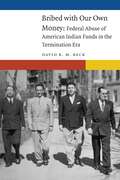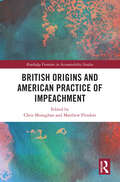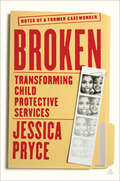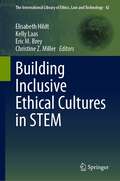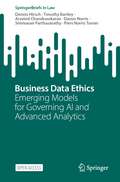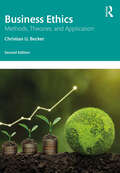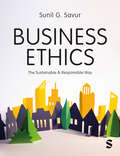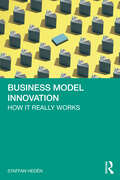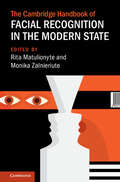- Table View
- List View
Big Data and Competition Law: Market Power Assessment in the Data-Driven Economy (Routledge Research in Competition Law)
by Alptekin KoksalRecent studies on competition law and digital markets reveal that accumulating personal information through data collection and acquisition methods benefits consumers considerably. Free of charge, fast and personalised services and products are offered to consumers online. Collected data is now an indispensable part of online businesses to the point that a new economy, a data-driven sector, has emerged. Many markets such as the social network, search engine, online advertising and e-commerce are regarded as data-driven markets in which the utilisation of Big Data is a requisite for the success of operations. However, the accumulation and use of data brings competition law concerns as they contribute to market power in the online world, resulting in a few technology giants gaining unprecedented market power due to the Big Data accumulation, indirect network effects and the creation of online ecosystems. As technology giants have billions of consumers worldwide, data-driven markets are truly global. In these data-driven markets, technology giants abuse their dominant positions, but existing competition law tools seem ineffective in addressing market power and assessing abusive behaviour related to Big Data. This book argues that a novel approach to the data-driven sector must be developed through the application of competition law rules to address this. It argues that current and potential conflicts can be mitigated by extending the competition law assessment beyond the current competition law tools to offer a modernised and unified approach to the Big Data–related competition issues. Promoting new legal tests for addressing the market power of technology giants and assessing abusive behaviour in data-driven markets, this book advocates for cooperation between competition and data protection authorities. It will be of interest to students, academics and practitioners with an interest in competition law and data protection.
Biharis in Bangladesh: Transition from Statelessness to Citizenship
by Zaglul HaiderThis book deals with the citizenship status of the Biharis in Bangladesh and their ability to access rights associated with citizenship. The main argument of the book is that although legally the Biharis are citizens of Bangladesh, they still do not have access to many important rights of citizenship that can make their citizenship meaningful. Their inability to access many important citizenship rights made them de facto stateless, although they are de-jure citizens. Taking a law and society approach this book examines both legal and non-legal factors behind the deplorable conditions of the Biharis in Bangladesh. Based on fieldwork, this book analyses that the Biharis’ inability to access citizenship rights is inconsistent with citizenship theory, citizenship laws, and the Constitution of Bangladesh. To make the Biharis citizenship effective or meaningful the author suggests some recommendations for policy changes that would enable Biharis to access rights associated with citizenship.
Bioethics: Foundations, Applications and Future Challenges
by Irene Cambra-Badii Ester Busquets-Alibés Terribas-Sala Núria Josep-E. BañosThe aim of this book is to introduce and discuss bioethics in a three-synergistic way: from the foundations to the current debates in relation to healthcare and social bioethics, and thereafter the possible future challenges. In this sense, the target audience can be from diverse disciplines: life and medical sciences, law, philosophy, psychology, and education. The book will be useful to high school students, in their first contacts with bioethics, college students, teachers and researchers, and the general public interested in these controversial debates of the past, present and future of bioethics.
Biology of Forensically Important Invertebrates
by Shyamasree Ghosh Dhriti BanerjeeThis book emphasizes the important role of invertebrates in forensic sciences in the detection of crimes, determining the time and place of death, estimating the minimum Post-Mortem Interval (PMI), and determining the cause of death. The initial chapter discusses the forensically essential invertebrates, especially flies under Order Diptera. Further, the book highlights the importance, biology, taxonomy, and biodiversity of flies under Order Diptera with forensic importance. It also discusses the Cuticular HydroCarbons (CHC) and spectrometry-based studies reported from flies and larvae of forensic importance. It further reviews the importance of DNA barcoding in molecular taxonomy-based studies on forensic flies through understanding, identification, and grouping the organisms. Towards the end, this book presents the applications and limitations of forensic entomology in cases of animal cruelty to a veterinary professional.
Blockchain and the Law: Dogmatics and Dynamics (Information Technology and Law Series #37)
by Francisco Pereira Coutinho Martinho Lucas Pires Bernardo Correia BarradasThis book discusses the dogmatic (that what is settled) and the dynamic (that what is changing) aspects of the relationship between blockchain and the law from a critical perspective. With contributions from legal and financial experts involved in both academy and business from Europe, Africa and North and South America, the book looks at the abstract complexities and practical challenges of regulating blockchain technology and its developments, such as crypto assets and smart contracts, from the perspectives of financial, tax, civil, and international law. Moreover, the book also delves into some exciting and cutting-edge related topics such as blockchain applications for litigation, CBDC and elections.The volume offers insightful considerations that will be helpful for legal practitioners involved in the crypto and Distributed Ledger Technology (DLT) phenomenon.Francisco Pereira Coutinho is Associate Professor at the Nova School of Law in Lisbon, Portugal.Martinho Lucas Pires is Teaching Assistant in the Department of Law of the Universidade Católica Portuguesa in Lisbon, Portugal.Bernardo Correia Barradas is a Lawyer and Senior Legal Advisor in payments in Washington DC, United States.
Blood Money: Why the Powerful Turn a Blind Eye While China Kills Americans
by Peter SchweizerIt’s often said that China is in a cold war with America. The reality is far worse: the war is hot, and the body count is one-sided. <p><p> China is killing Americans and working aggressively to maximize the carnage while our leaders remain passive and, in some cases, compliant. Why? <p><p> If anyone could crack the code, it’s the renowned nonpartisan investigator Peter Schweizer. Schweizer’s previous three number one New York Times bestsellers sent shock waves through official Washington, sparking FBI investigations and congressional probes that continue to this day. <p><p> For Blood Money, Schweizer and his team of forensic investigators spent more than two years scouring a trove of restricted Chinese military documents, data-mining a mountain of American financial records, and tracking US political leaders’ investments and family businesses. Schweizer unloads bombshell after bombshell, exposing the Chinese Communist Party’s covert operations in the American drug trade, social justice movement, and medical establishment to sow chaos and decadence in the United States. <p><p> A towering achievement of investigative journalism, Blood Money is one of those rare books that makes you clearly see the world anew. <p> <b>New York Times Bestseller</b>
Blue Book on AI and Rule of Law in the World (Artificial Intelligence and the Rule of Law)
by Yadong CuiThis book focuses on the development of artificial intelligence and rule of law in the world, by collecting and summarizing the information about the development of artificial intelligence and rule of law in China and the world, covering topics like AI strategy, policy, law, theoretical research and practical application, etc. It makes an in-depth analysis so as to provide an objective, fair and accurate report. The purpose is to promote the study of AI and law, promote the construction of AI and rule of law system and create an AI and rule of law environment. In particular, it aims to play an active role in promoting the establishment of legislative norms, legal systems, policy systems and ethical norms that are compatible with the innovative development of AI, promoting the implementation of a new generation of national AI development strategies, ensuring the safe, reliable, controllable, healthy and sustainable development of AI. It is hoped that this book may provide useful reference for researchers of AI and law.
Bluecoated Terror: Jim Crow New Orleans and the Roots of Modern Police Brutality
by Jeffrey S. AdlerA searing chronicle of how racist violence became an ingrained facet of law enforcement in the United States. Too often, scholars and pundits argue either that police violence against African Americans has remained unchanged since the era of slavery or that it is a recent phenomenon and disconnected from the past. Neither view is accurate. In Bluecoated Terror, Jeffrey S. Adler draws on rich archival accounts to show, in narrative detail, how racialized police brutality is part of a larger system of state oppression with roots in the early twentieth-century South, particularly New Orleans. Wide racial differentials in the use of lethal force and beatings during arrest and interrogation emerged in the 1930s and 1940s. Adler explains how race control and crime control blended and blurred during this era, when police officers and criminal justice officials began to justify systemic violence against Black people as a crucial—and legal—tool for maintaining law and order. Bluecoated Terror explores both the rise of these law-enforcement trends and their chilling resilience, providing critical context for recent horrific police abuses as the ghost of Jim Crow law enforcement continues to haunt the nation.
Bluefield Housing as Alternative Infill for the Suburbs
by Damian MadiganSuburbanised cities share a common dilemma: how to transition to more densely populated and socially connected urban systems while retaining low-rise character, avoiding gentrification, and opening neighbourhoods to more diverse housing choices. Bluefield Housing offers a new land definition and co-located infill model addressing these concerns, through describing and deploying the types of ad-hoc modifications that have been undertaken in the suburbs for decades. Extending green-, brown-, and greyfield definitions, it provides a necessary middle ground between the ‘do nothing’ attitude of suburban preservation and the ‘do everything’ approach of knock-down-rebuild regeneration. An adjunct to ‘missing middle’ and subdivision densification models, with a focus on co-locating homes on small lots, Bluefield Housing presents a unified design approach to suburban infill: retrofitting original houses, retaining and enhancing landscape and urban tree canopies, and delivering additional homes as low-rise additions and backyard homes suited to the increasingly complex make-up of our households. Extensively illustrated by the author with engaging architectural design studies, Damian Madigan describes how existing quirks of suburban housing can prompt new forms of infill, explains why a new suburban densification model is not only necessary but can be made desirable for varied stakeholders, and charts a path towards the types of statutory and market triggers required to make bluefield housing achievable. Using Australian housing as an example but addressing universal concerns around neighbourhood character, demographic needs, housing diversity, dwelling flexibility, and landscape amenity, Bluefield Housing offers innovative suburban infill ideas for policy makers, planners, architects, researchers and students of housing and design studies, and for those with a stake in the future of the suburbs.
Bluefield Housing as Alternative Infill for the Suburbs
by Damian MadiganSuburbanised cities share a common dilemma: how to transition to more densely populated and socially connected urban systems while retaining low-rise character, avoiding gentrification, and opening neighbourhoods to more diverse housing choices. Bluefield Housing offers a new land definition and co-located infill model addressing these concerns, through describing and deploying the types of ad-hoc modifications that have been undertaken in the suburbs for decades. Extending green-, brown-, and greyfield definitions, it provides a necessary middle ground between the ‘do nothing’ attitude of suburban preservation and the ‘do everything’ approach of knock-down-rebuild regeneration.An adjunct to ‘missing middle’ and subdivision densification models, with a focus on co-locating homes on small lots, Bluefield Housing presents a unified design approach to suburban infill: retrofitting original houses, retaining and enhancing landscape and urban tree canopies, and delivering additional homes as low-rise additions and backyard homes suited to the increasingly complex make-up of our households.Extensively illustrated by the author with engaging architectural design studies, Damian Madigan describes how existing quirks of suburban housing can prompt new forms of infill, explains why a new suburban densification model is not only necessary but can be made desirable for varied stakeholders, and charts a path towards the types of statutory and market triggers required to make bluefield housing achievable. Using Australian housing as an example but addressing universal concerns around neighbourhood character, demographic needs, housing diversity, dwelling flexibility, and landscape amenity, Bluefield Housing offers innovative suburban infill ideas for policy makers, planners, architects, researchers and students of housing and design studies, and for those with a stake in the future of the suburbs.The Open Access version of this book, available at www.taylorfrancis.com, has been made available under a Creative Commons Attribution-Non Commercial-No Derivatives (CC-BY-NC-ND) 4.0 license.
The Borders of the European Union in a Conflictual World: Interdisciplinary European Studies
by Antonina Bakardjieva Engelbrekt Per Ekman Anna Michalski Lars OxelheimThis open access book examines the implications for the EU of a radically changed international context characterized by systemic rivalry, competition over norms and regulations, and growing strategic tension. Globalization that once tied national economies together and internationalized social phenomena, such as education, research and innovation, and tourism, has gone in reverse. An opposite trend is driving the world into distinct spheres of competing models of governance, regulation, technological development, and communication. Facing the most extensive rupture of economic and inter-state relations since the onset of the Cold War, the management of the EU’s internal and external borders is taking on a completely new meaning. The open access book brings together scholars from economics, law, and political science to provide up dated assessments and policy advice on the insecurity in the neighborhood and war in Ukraine, the EU’s role in the future European security architecture,weaponized energy dependence, and the global competition on norms.
Born of War in Colombia: Reproductive Violence and Memories of Absence (Genocide, Political Violence, Human Rights)
by Tatiana Sanchez ParraBorn of War in Colombia addresses why people born of conflict-related sexual violence remain unseen within transitional justice agendas. In Colombia, there are generations of children born of conflict-related sexual violence across the country. Whispers of their presence have traveled outside their communities. They also exist within the country’s domestic reparations program, which entitles them to reparations. Drawing on an immersive feminist ethnography with a community that endured a paramilitary confinement, the book reveals how a past-oriented and harm-centered model of transitional justice has converged with a restricted notion of gendered victimhood and the patriarchal politics of reproduction to render the bodies and experiences of people born of conflict-related sexual violence unintelligible to those seeking to understand and address the consequences of war in Colombia.
Brexit and the European Insurance Market: An empirical Analysis of the Impact on the Structure of the European Insurance Market, Stock Market Reactions and the Solvency II Supervisory Regime (Business, Economics, and Law)
by Antonia MüllerWith the Brexit referendum more than 50% of the British population voted in favour of the UK leaving the EU. Since that event, much speculation has been about Brexit impact on the global economy, also affecting the insurance market. Existing papers and literature indicate potential significant Brexit implications on the structure of the European insurance market due to the loss of the European Passport, the European Solvency II supervisory regime, as well as on stock prices of insurance companies based in the EU and UK, but so far there is no holistic view on this topic. The dissertation aims to bring together the fragmentary information on Brexit implications for the European insurance market, develop methodological approaches further, conduct new analyses, and reflect a holistic picture of the impact of Brexit on the European insurance market, focusing on the structure of the European insurance market, stock market reactions and the Solvency II supervisory regime.
Bribed with Our Own Money: Federal Abuse of American Indian Funds in the Termination Era (New Visions in Native American and Indigenous Studies)
by David R. BeckIn Bribed with Our Own Money David R. M. Beck analyzes the successes and failures of Indigenous nations&’ opposition to federal policy in the 1950s and 1960s. Focusing on case studies from six Native nations, Beck recounts how the U.S. government coerced American Indian nations to accept termination of their political relationship with the United States by threatening to withhold money that belonged to the tribes. Termination was the continuation—and, federal officials hoped, the culmination—of more than a century of policy initiatives intended to end the political relationship between Indian tribal nations and the federal government. Termination was also intended to assimilate American Indian individuals into the country&’s social and economic culture and to remove the remainder of reservation lands from federal trust. American Indians hoped to gain greater opportunities of self-governance and self-determination, but they wanted to do so under the protection of the federal trust relationship.Bribed with Our Own Money analyzes both successful and unsuccessful efforts of Native nations to oppose this policy within the larger context of long-standing federal abuse of tribal funds. It is the first book to view federal termination efforts grounded in bribery for what they were: a form of coercion.
British Origins and American Practice of Impeachment (Routledge Frontiers in Accountability Studies)
by Chris Monaghan and Matthew FlindersThis collection brings together historians, political scientists and legal scholars to explore the Anglo-American origins of impeachment and its use in the USA. Impeachment originated in England during the Good Parliament of 1376. It was used, subject to several periods of disuse, until the beginning of the 19th century. The British form of impeachment in turn inspired the drafters of the US Constitution and the inclusion of a mechanism permitting the removal of members of the federal executive and federal judiciary. These Anglo-American origins of impeachment have inspired many constitutions around the globe to include impeachment mechanisms which permit, in most cases, the legislature to remove the President, a Prime Minister, ministers and judges. This volume explores the origins, influence and practice of impeachment. Divided into three parts, the history of impeachment and how it developed in British history is the focus of part one. The inclusion of Ireland reflects the constitutional status of impeachment, the legacy of union with Great Britain and how impeachment can still serve as a deterrent. Part two examines the adoption of impeachment within the US Constitution and its use in practice. The third and final part discusses impeachment in the 21st century. The book will be an essential resource for students, academics and researchers in law, political science and history.
Broken: Transforming Child Protective Services—Notes of a Former Caseworker
by Jessica PryceJoining the ranks of Evicted and The New Jim Crow, a former caseworker’s searing, clear-eyed investigation of the child welfare system—from foster care to incarceration—that exposes the deep-rooted biases shaping the system, witnessed through the lives of several Black families.Dr. Jessica Pryce knows the child welfare system firsthand and, in this long overdue book, breaks it down from the inside out, sharing her professional journey and offering the crucial perspectives of caseworkers and Black women impacted by the system. It is a groundbreaking and eye-opening confrontation of the inherent and systemic racism deeply entrenched within the child welfare system.Pryce started her social work career with an internship where she was committed to helping keep children safe. In the book, she walks alongside her close friends and even her family as they navigate the system, while sharing her own reckoning with the requirements of her job and her role in the systemic harm. Through poignant narratives and introspection, readers witness the harrowing effects of a well-intentioned workforce that has lost its way, demonstrating how separations are often not in a child’s best interests.With a renewed commitment to strengthening families in her role as activist, Pryce invites the child welfare workforce to embark on a journey of self-reflection and radical growth. At once a framework for transforming child protective services and an intimate, stunning first-hand account of the system as it currently operates, Broken takes everyday scenarios as its focus rather than extreme child welfare cases, challenging readers to critically examine their own mindsets and biases in order to reimagine how we help families in need.
Building Inclusive Ethical Cultures in STEM (The International Library of Ethics, Law and Technology #42)
by Elisabeth Hildt Kelly Laas Eric M. Brey Christine Z. MillerThis book shares innovative approaches to effectively engage students and faculty working in research labs, lab-based classrooms and courses to build inclusive ethical cultures. The frameworks and approaches presented move beyond traditional research ethics training to strengthen the ethical culture in research labs. The chapters in the book showcase best practices and approaches to embedding educational interventions in courses, research labs and departments. The book is based on the two-day workshop “Building Inclusive Ethical Cultures in STEM” (April 23-24, 2021). Moving beyond the two-day conference that inspired this collected volume, the various chapters address questions like: What are approaches and tools to integrate ethics education in STEM effectively? How can STEM ethics education be improved? What can researchers do to build more inclusive research environments? How can meaningful discussions about ethics be effectively integrated into STEM courses, research labs, and workplace environments? While each chapter takes a different perspective and is located in its respective context, the contributions are united by the goal of effectively including ethical reflection in STEM education. Instructors from both four-year and two-year colleges who teach STEM and lab-based STEM courses; young principal investigators/junior faculty who are in the process of building their research groups; departmental chairs interested in programmatic approaches for improving mentoring, research ethics education, and the research culture of their department, will find this work to be a very valuable resource in their daily practice.
Business Data Ethics: Emerging Models for Governing AI and Advanced Analytics (SpringerBriefs in Law)
by Dennis Hirsch Timothy Bartley Aravind Chandrasekaran Davon Norris Srinivasan Parthasarathy Piers Norris TurnerThis open access book explains how leading business organizations attempt to achieve the responsible and ethical use of artificial intelligence (AI) and other advanced information technologies. These technologies can produce tremendous insights and benefits. But they can also invade privacy, perpetuate bias, and otherwise injure people and society. To use these technologies successfully, organizations need to implement them responsibly and ethically. The question is: how to do this? Data ethics management, and this book, provide some answers. The authors interviewed and surveyed data ethics managers at leading companies. They asked why these experts see data ethics as important and how they seek to achieve it. This book conveys the results of that research on a concise, accessible way. Much of the existing writing on data and AI ethics focuses either on macro-level ethical principles, or on micro-level product design and tooling. The interviews showed that companies need a third component: data ethics management. This third element consists of the management structures, processes, training and substantive benchmarks that companies use to operationalize their high-level ethical principles and to guide and hold accountable their developers. Data ethics management is the connective tissue makes ethical principles real. It is the focus of this book. This book should be of use to organizations that wish to improve their own data ethics management efforts, legislators and policymakers who hope to build on existing management practices, scholars who study beyond compliance business behavior, and members of the public who want to understand better the threats that AI poses and how to reduce them.
Business Ethics: Methods, Theories, and Application
by Christian U. BeckerBusiness Ethics: Methods, Theories, and Application provides a new systematic approach to normative business ethics that covers the complex and various ethical challenges of modern business. It aims to train analytical thinking skills in the field of business ethics and to approach ethical issues in business in a rational and systematic way.The book develops a number of specific methods for business ethics analysis that are tailored for ethical decision-making in business and for analyzing complex ethical topics in business. The book discusses fundamental ethical questions regarding the meaning of business and the economy for the individual person, society, the environment, and people around the world.As a result, Business Ethics: Methods, Theories, and Application develops normative guidelines for business in the 21st century and its fundamental challenges and will be key reading for undergraduate, postgraduate, and MBA students of business ethics, business strategy, business and society, and related fields.This second edition is fully updated to recognize the changing nature of ethics and corporate responsibility in a globalized world and includes online support material.
Business Ethics: The Sustainable and Responsible Way
by Sunil G SavurBusiness Ethics: The Sustainable and Responsible Way provides a fresh, contemporary, and hands-on approach to business ethics, emphasizing practical skills. This practical approach is supported through a rich array of short and long case studies from across the globe, including countries such as the UK, Australia, the US, India, China, Nigeria and Ghana. Cases feature companies such as Patagonia, the Aravind Eye Clinic, Merck and LEGO and examine topics such as the gig economy, fast fashion, electric vehicles, artificial intelligence, and space exploration. Accompanying questions also encourage reflection and the skills needed to apply theory to real-life scenarios. This textbook is suitable for undergraduate and postgraduate students of business ethics, as well as those studying business and society, corporate social responsibility, sustainability, and responsible management. Online resources include PowerPoint slides and a Teaching Guide. Dr Sunil G. Savur is a Business Ethics lecturer and researcher at the University of South Australia, Adelaide.
Business Ethics: The Sustainable and Responsible Way
by Sunil G SavurBusiness Ethics: The Sustainable and Responsible Way provides a fresh, contemporary, and hands-on approach to business ethics, emphasizing practical skills. This practical approach is supported through a rich array of short and long case studies from across the globe, including countries such as the UK, Australia, the US, India, China, Nigeria and Ghana. Cases feature companies such as Patagonia, the Aravind Eye Clinic, Merck and LEGO and examine topics such as the gig economy, fast fashion, electric vehicles, artificial intelligence, and space exploration. Accompanying questions also encourage reflection and the skills needed to apply theory to real-life scenarios. This textbook is suitable for undergraduate and postgraduate students of business ethics, as well as those studying business and society, corporate social responsibility, sustainability, and responsible management. Online resources include PowerPoint slides and a Teaching Guide. Dr Sunil G. Savur is a Business Ethics lecturer and researcher at the University of South Australia, Adelaide.
Business Model Innovation: How it really works
by Staffan HedénBased on the author’s 30 years of consulting experience and validated by doctoral research, this book focuses on creating profitable growth with business model innovation in medium and large companies. Arising from an increased need for systems thinking and technological development, there is a common understanding that a business model should primarily create, develop, and retain value for companies' customers. But increased globalization and resource constraints have led to a difficult balancing act when addressing the challenges of achieving profitable processes and long-term growth. This book provides a new framework, based on six central themes with five related success factors each, to enhance opportunities’ visibility, contribute to improved margins, increase awareness of a company’s unique strengths and weaknesses in overall resources, manage risk, and optimize implementation of a new model throughout an entire organization. Owners, board members, and managers of medium and large companies worldwide, as well as advanced business students, will appreciate this detailed, practical, and clarifying approach to business model innovation.
Calling Sergeant Crockford: The story of a pioneering policewoman in the 1960s
by Ruth D'AlessandroIt's the dawn of the Swinging Sixties. The Cold War is at its height and support for the Campaign for Nuclear Disarmament is building. The Berkshire Constabulary's Detective Gwen Crockford is promoted to Woman Police Sergeant in Newbury – the town at the heart of Britain's atomic weapons programme.Gwen's initial reservations that her posting in rural Berkshire will be boring soon prove to be unfounded. A serial sex attacker on the loose, an attempted murder at Greenham Common US Airforce Base, and a charismatic heiress with a family secret keep things interesting for the capable sergeant.Laser-focused on her police career – and resigned to the single life – Gwen is forced to re-evaluate her plans when a nature-loving war veteran PC walks into the station with an orphaned fox cub, and there's a shocking discovery in a railway station lavatory.Written by her daughter Ruth and rich in social history, this is the story of a real-life woman police sergeant at the top of her game, guiding her WPCs through the immense societal changes of the early 1960s.
Calling Sergeant Crockford: The story of a pioneering policewoman in the 1960s
by Ruth D'AlessandroIt's the dawn of the Swinging Sixties. The Cold War is at its height and support for the Campaign for Nuclear Disarmament is building. The Berkshire Constabulary's Detective Gwen Crockford is promoted to Woman Police Sergeant in Newbury – the town at the heart of Britain's atomic weapons programme.Gwen's initial reservations that her posting in rural Berkshire will be boring soon prove to be unfounded. A serial sex attacker on the loose, an attempted murder at Greenham Common US Airforce Base, and a charismatic heiress with a family secret keep things interesting for the capable sergeant.Laser-focused on her police career – and resigned to the single life – Gwen is forced to re-evaluate her plans when a nature-loving war veteran PC walks into the station with an orphaned fox cub, and there's a shocking discovery in a railway station lavatory.Written by her daughter Ruth and rich in social history, this is the story of a real-life woman police sergeant at the top of her game, guiding her WPCs through the immense societal changes of the early 1960s.
The Cambridge Handbook of Facial Recognition in the Modern State (Cambridge Law Handbooks)
by Rita Matulionyte Monika ZalnieriuteIn situations ranging from border control to policing and welfare, governments are using automated facial recognition technology (FRT) to collect taxes, prevent crime, police cities and control immigration. FRT involves the processing of a person's facial image, usually for identification, categorisation or counting. This ambitious handbook brings together a diverse group of legal, computer, communications, and social and political science scholars to shed light on how FRT has been developed, used by public authorities, and regulated in different jurisdictions across five continents. Informed by their experiences working on FRT across the globe, chapter authors analyse the increasing deployment of FRT in public and private life. The collection argues for the passage of new laws, rules, frameworks, and approaches to prevent harms of FRT in the modern state and advances the debate on scrutiny of power and accountability of public authorities which use FRT. This book is also available as Open Access on Cambridge Core.
